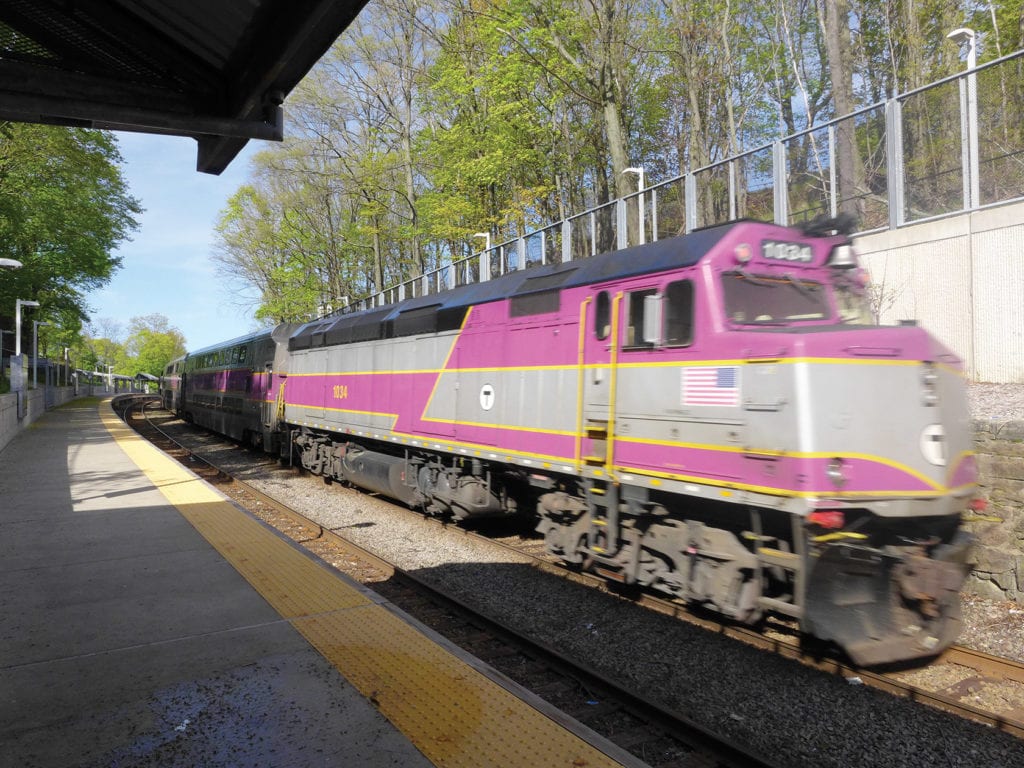Collins pushes for faster Fairmount
Budget amendment would fund pilot project

When Jarred Johnson worked at the Codman Square Community Development Corporation, the Fairmount Line came in handy for trips to 1010 Massachusetts Avenue, where the city’s Inspectional Services Department is housed.
“If you timed it out right, you could get there in 10 minutes,” he said.
But getting back was another matter.

Commuters wait for the #23 bus on Washington Street while a Fairmount Line commuter rail train idles at the Four Corners/ Geneva Avenue station in Dorchester. BANNER PHOTO
“If you missed the train, you’d have to wait another hour for the next one,” he notes.
While Fairmount Line trains run every 40 minutes for the morning and evening rush hours, the hour-long intervals at midday greatly diminish the efficacy of the line for residents of the Hyde Park, Mattapan, Dorchester and Roxbury neighborhoods the line traverses.
State Sen. Nick Collins is looking to speed things up along the sleepy Fairmount Line with a budget amendment that would allow for service at 15-minute intervals.
“To me, it’s a transit equity issue,” Collins told the Banner. “If we’re going to keep our promise that everyone will have a fair shot in this economic boom, this has to happen. We need rapid transit and, ultimately, electrification.”
In addition to the increased frequency, Collins’ budget amendment would fund a study on the feasibility of converting the commuter rail line into a rapid transit line.
“We have an opportunity in the next year to get data and conduct a study on the cost,” Collins said.
When the Fairmount line was originally constructed, it included stops in Roxbury and Dorchester, but as the neighborhoods’ demographics changed to predominantly African American, the stops were closed. For decades, the trains whizzed through Dorchester and Roxbury, carrying Hyde Park residents to South Station.
As part of a package of pollution mitigation measures the state agreed to in order to win federal approval for the Big Dig highway reconstruction project and third harbor tunnel, the MBTA was required to open new stops on the Fairmount Line. Stops were added at Four Corners, Talbot Avenue and, last month, Mattapan Square.
Although the administration of former Gov. Deval Patrick agreed to purchase special diesel trains designed to accelerate and brake faster than traditional, locomotive-driven commuter trains, thereby allowing for more frequency on the line, the administration of Gov. Charlie Baker backed away from that commitment.
Collins says for the pilot project called for in his budget amendment, Fairmount Line trains would run with fewer cars to allow faster stops and starts. The greater frequency of service would make up for the diminished capacity.
Johnson, who now is chief operating officer for the advocacy group TransitMatters, says the increased frequency could open up access to jobs in industrial areas along the line, such as the Readville section of Hyde Park as well as in downtown Boston.
“If done right, it could be a real opportunity to provide pathways to employment,” he said.
Collins says he has support from members of the Boston delegation in the Legislature. If the budget amendment passes, Collins says, the pilot project could begin during the 2020 fiscal year, which begins in July.







